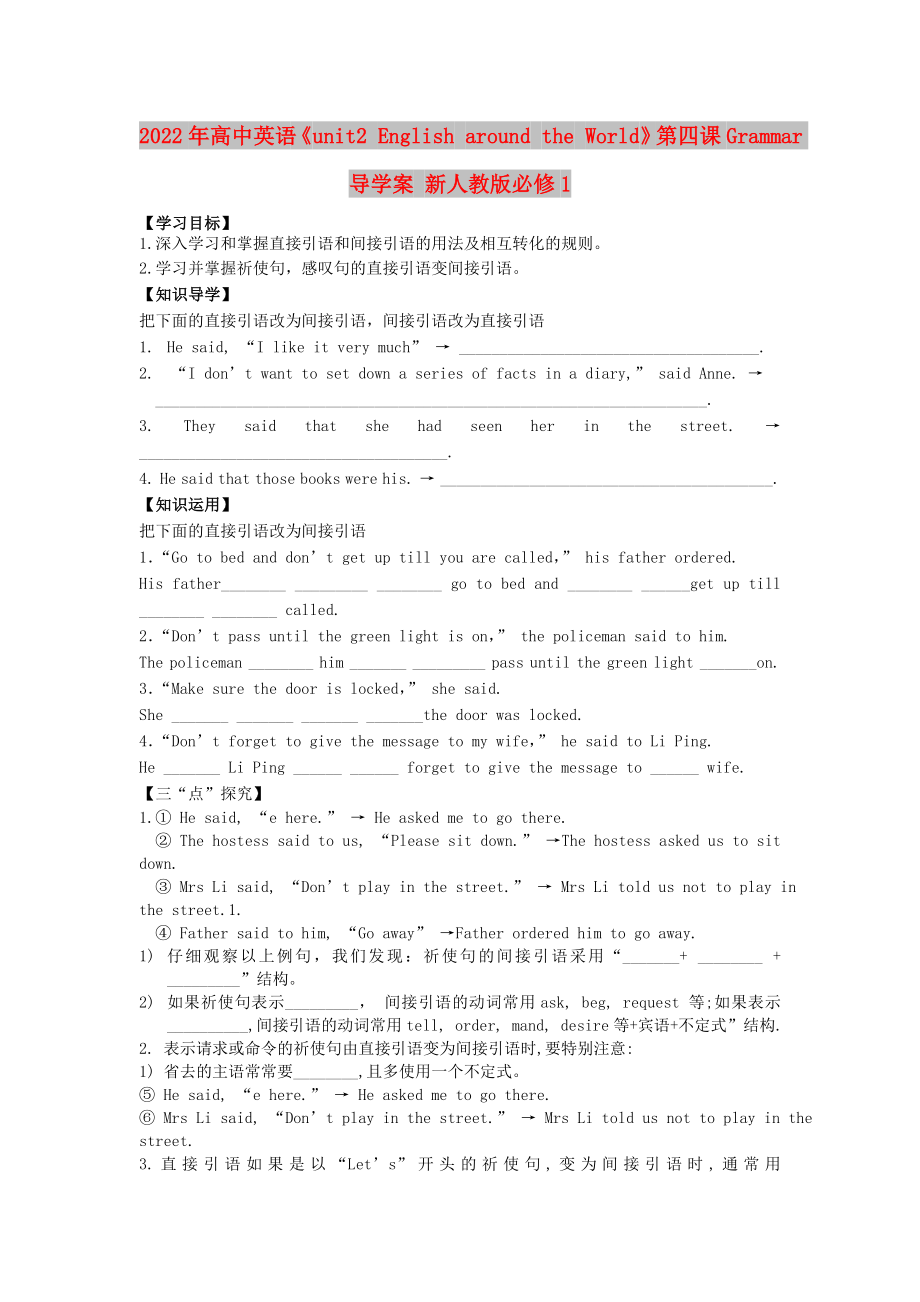《2022年高中英語(yǔ)《unit2 English around the World》第四課Grammar導(dǎo)學(xué)案 新人教版必修1》由會(huì)員分享,可在線閱讀,更多相關(guān)《2022年高中英語(yǔ)《unit2 English around the World》第四課Grammar導(dǎo)學(xué)案 新人教版必修1(3頁(yè)珍藏版)》請(qǐng)?jiān)谘b配圖網(wǎng)上搜索�����。
1�、2022年高中英語(yǔ)《unit2 English around the World》第四課Grammar導(dǎo)學(xué)案 新人教版必修1
【學(xué)習(xí)目標(biāo)】
1.深入學(xué)習(xí)和掌握直接引語(yǔ)和間接引語(yǔ)的用法及相互轉(zhuǎn)化的規(guī)則。
2.學(xué)習(xí)并掌握祈使句�����,感嘆句的直接引語(yǔ)變間接引語(yǔ)��。
【知識(shí)導(dǎo)學(xué)】
把下面的直接引語(yǔ)改為間接引語(yǔ)����,間接引語(yǔ)改為直接引語(yǔ)
1. He said, “I like it very much” → _____________________________________.
2. “I don’t want to set down a series of facts in a diary
2、,” said Anne. →
____________________________________________________________________.
3. They said that she had seen her in the street. → ______________________________________.
4. He said that those books were his. → _________________________________________.
【知識(shí)運(yùn)用】
把下面的直接引語(yǔ)改為間接引語(yǔ)
1.“Go to
3�����、bed and don’t get up till you are called����,” his father ordered.
His father________ _________ ________ go to bed and ________ ______get up till ________ ________ called.
2.“Don’t pass until the green light is on,” the policeman said to him.
The policeman ________ him _______ _________ pass until th
4����、e green light _______on.
3.“Make sure the door is locked,” she said.
She _______ _______ _______ _______the door was locked.
4.“Don’t forget to give the message to my wife�,” he said to Li Ping.
He _______ Li Ping ______ ______ forget to give the message to ______ wife.
【三“點(diǎn)”探究】
1.① He said, “e
5、 here.” → He asked me to go there.
② The hostess said to us, “Please sit down.” →The hostess asked us to sit down.
③ Mrs Li said, “Don’t play in the street.” → Mrs Li told us not to play in the street.1.
④ Father said to him, “Go away” →Father ordered him to go away.
1) 仔細(xì)觀察以上例句����,我們發(fā)現(xiàn):祈使句的間接引語(yǔ)采用
6、“_______+ ________ + _________”結(jié)構(gòu)�。
2) 如果祈使句表示_________, 間接引語(yǔ)的動(dòng)詞常用ask, beg, request 等;如果表示__________,間接引語(yǔ)的動(dòng)詞常用tell, order, mand, desire等+賓語(yǔ)+不定式”結(jié)構(gòu).
2. 表示請(qǐng)求或命令的祈使句由直接引語(yǔ)變?yōu)殚g接引語(yǔ)時(shí),要特別注意:
1) 省去的主語(yǔ)常常要________,且多使用一個(gè)不定式�。
⑤ He said, “e here.” → He asked me to go there.
⑥ Mrs Li said, “Don’t play in the s
7、treet.” → Mrs Li told us not to play in the street.
3.直接引語(yǔ)如果是以“Let’s”開(kāi)頭的祈使句,變?yōu)殚g接引語(yǔ)時(shí),通常用“____________________”��。
⑦ He said, “Let’s go to the film.” → He suggested going to the film. / He suggested that we should go to the film.
4.感嘆句從直接引語(yǔ)變?yōu)殚g接引語(yǔ)時(shí),要注意:
⑧ He said, “Oh, what a pity this is!” →He crie
8���、d out what a pity that was.
⑨ He says to us, “What bad weather it is!” →He tells us that the weather is really bad.
1) 適當(dāng)改動(dòng)引用_______ ,仍然使用________和_________作連詞,語(yǔ)序_________��。
2) 感嘆句從直接引語(yǔ)變?yōu)殚g接引語(yǔ)時(shí),也可以用_________ 引導(dǎo),將句子變成相應(yīng)的賓語(yǔ)從句�����。
【拓展提升】
1.請(qǐng)把下列直接引語(yǔ)轉(zhuǎn)化成間接引語(yǔ)
1) “Please turn on the radio.” My mother said
9��、to me.
2) “Don’t make so much noise, boys.” The teacher said.
3) He said, “How nice this picture is!”
4) She says, “I have lost my English book.”
2. 用適當(dāng)?shù)脑~填空��,使句意不變
5)“Please close the door��,”he said to me.
He _______ me _______ _______ the door.
6).Mom said to me����,“Don’t tell a lie.”
Mom
10、 ________ me ______ ______tell a lie.
7)“Please e here again tomorrow.” he said.
He asked me _________ _______ _______ _______ _______ _______ _______.
8) Kate said�,“Let’s discuss the problem next week.”
Kate suggested __________the problem__________ _________ ___________.
Kate suggested that w
11、e _______________________the problem _____________ ____________ _________________.
9) My teacher always said���,“What an interesting and challenging job teaching is��!”
My teacher always said ___________ an interesting and challenging job teaching _________.
【總結(jié)反思】
本課時(shí)的核心內(nèi)容為“直接引語(yǔ)變間接引語(yǔ)”,知識(shí)要點(diǎn)圖解如下:
12���、
Period 4 Grammar
【知識(shí)導(dǎo)學(xué)】
1. He said that he liked it very much.
2. Anne said that she didn’t want to set down a series of facts in a diary.
3. They said, “We saw her in the street.”
4. He said, “These books are mine.”
【知識(shí)運(yùn)用】
1. ordered him to not to he was 2. told not
13、 to was
3. asked to make sure 4. asked not to his
【三“點(diǎn)”探究】
1. 1) 動(dòng)詞+賓語(yǔ)+不定式 2) . 請(qǐng)求 命令
2. 補(bǔ)上
3. suggest + v-ing(或從句)
4. 1) 動(dòng)詞 what how 不變 2) that
【拓展提升】
1. 1) My mother asked me to turn on the radio.
2)The teacher told the boys not to make so much noise.
3) He cried out how nice that picture was.
4) She says that she has lost her English book.
2.5)asked to close 6) told not to 7) to go there again the next day
8) discussing the next week (should) discuss the next week
9) what was
 2022年高中英語(yǔ)《unit2 English around the World》第四課Grammar導(dǎo)學(xué)案 新人教版必修1
2022年高中英語(yǔ)《unit2 English around the World》第四課Grammar導(dǎo)學(xué)案 新人教版必修1

